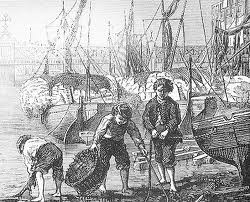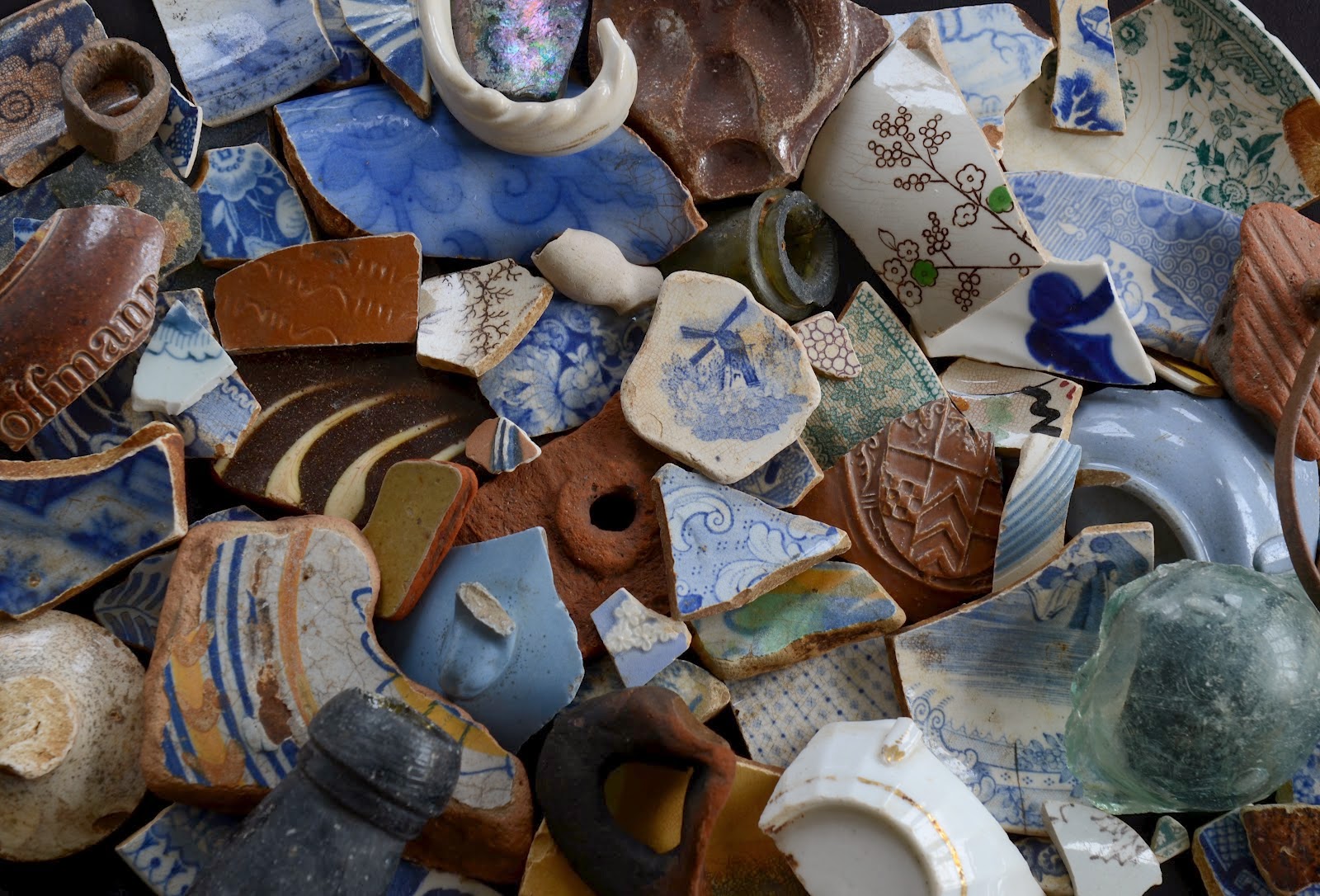By Guest Blogger Alex Maccioni
On the face of it, mudlarking seems awful. Kristine has previously made it clear that its originswere brutal, dirty and desperate. Yet today you will often see people enjoying a spot of it after Sunday lunch with their children in tow. From my personal experiences I’d say that mudlarking has never been in better health, with more and more people becoming enthralled at the prospect of finding real treasure along the riverbank. The adrenaline rush from finding coins, broaches, bottles and bracelets on the grubby beaches is seriously addictive. There are not many hobbies where you can guarantee success of some sort, but this is one of them. Take anyone down to the banks in the right conditions and they will find clay pipes and china shards. If you stay long enough you will invariably find a piece with a pattern or a bit of text on it as well.
Part of the appeal for many is the fact that they feel reconnected with the Thames having been left feeling anaesthetised to its charms by fences, walls and steep drops. When they are actually splashing in puddles on the riverbank, seeing ducks and herons and witnessing the surprisingly large amount of boat traffic on the river, they are reminded about how impressive it really is. Mudlarking is about much more than filling your pockets with interesting bits and bobs.
The experience could be improved if there was less rubbish in the Thames, but when mudlarking you are always aware that one man’s rubbish is another man’s treasure, so I suppose that on one level it’s a necessary evil if future mudlarkers are to have anything to find! It probably also helps deter a great number of people, which means there will be more finds for those that are willing to put up with the odd can and bike dotted around the place.
Legal Considerations
It’s worth being aware of the legal element of mudlarking before you get cracking. Perhaps the most important thing to bear in mind is obvious: never trespass. No matter how good a patch of shore looks, you cannot ignore clear signage that states that your movements are limited in that area. As far as I understand it, anyone can walk along the bank and pick up anything that catches their eye, but if you wish to start digging around or using a metal detector then the Port of London Authority needs to be contacted first of all.
The 1996 Treasure Act is just as applicable on the Thames as it is elsewhere, so finders may not necessarily mean keepers. Basically, this means groups of coins, gold and silver objects need to be reported straightaway. If you have found something that is legally defined as being treasure then you must allow a museum to purchase it from you for a price set by independent advisors. If they don’t have the necessary funds or they just don’t want it then it is yours to keep.
But not all finds are ‘real’ treasure. Some of the best are things like Victorian glass bottles with a local borough marked on the glass. Although not intrinsically valuable, they are of immense local interest and importance. If you find anything like this then you don’t have to report it but it’s best if you do get in touch with the local Finds Liason Officer at your council. They will record it in detail and this can help to build up a very particular image of an areas past history. The find will also remain yours.
Safety
So that you are best prepared for mud and wind, it’s best to wear wellies and take a good waterproof. Preferably try to make sure that this is in a vivid or fluorescent colour so that if you do get into any difficulty that you will be easy to spot. Also, make sure you’re with someone else at all times. The tides can be vicious and rapid, so keep an eye on what the water around you is doing whilst also keeping your exit point in mind. Some plastic gloves may be worth wearing. We all know that there are some nasty items in the Thames and you don’t want to be getting this on your hands. In my experience I’d say the disposable surgical gloves are the best bet.
So this weekend, if the weather is good, go and give mudlarking a go – you’ll love it.
USEFUL ORGANISATIONS
Museum of London – They are fascinated by even the most mundane finds, so be sure to tell them all about your adventures.
Thames and Field – A club dedicated to bringing new people into the practice. They arrange regular meet ups which are brilliant places to learn about new locations and the finds of others.
London Mudlark – This is a fantastic Facebook page that is regularly updated with high quality images of historic finds from the Thames.
Port of London Authority – Look at the tides before you venture out!


